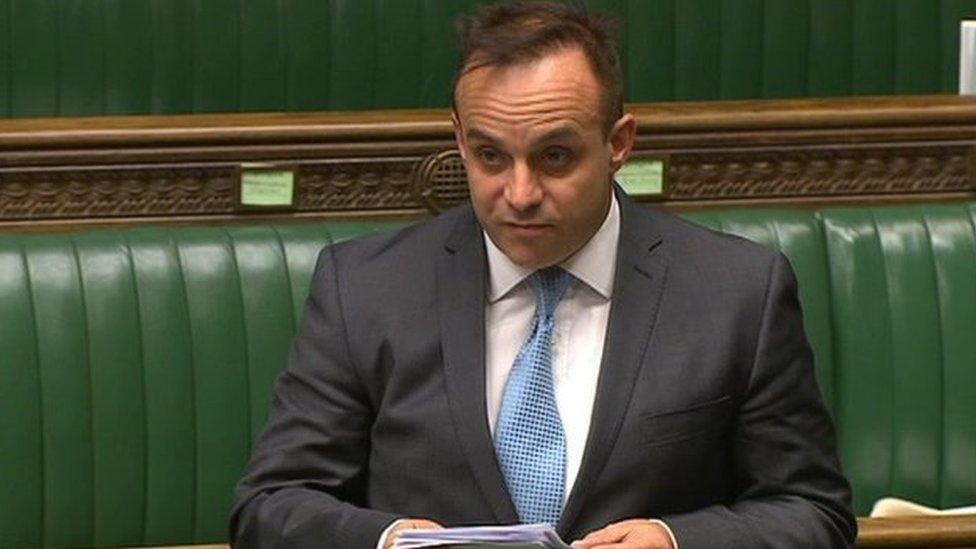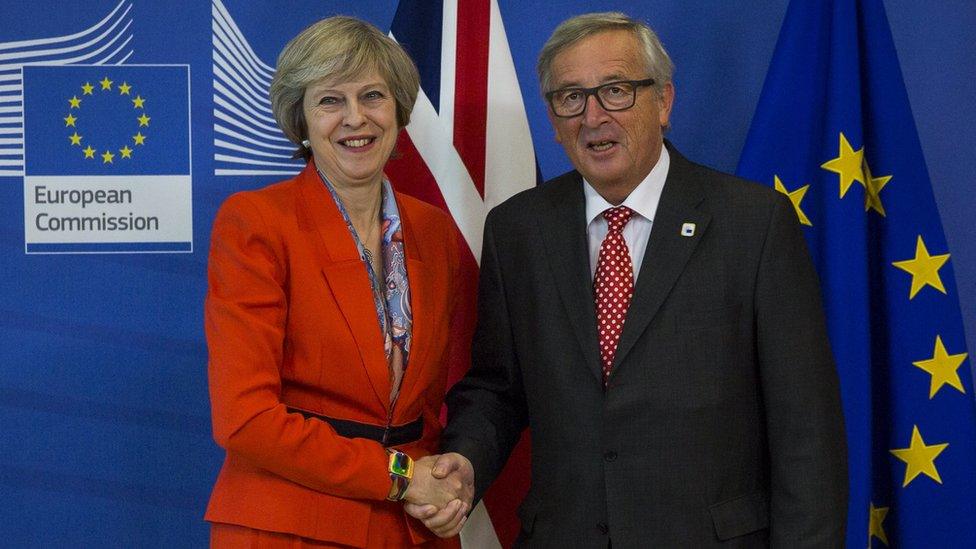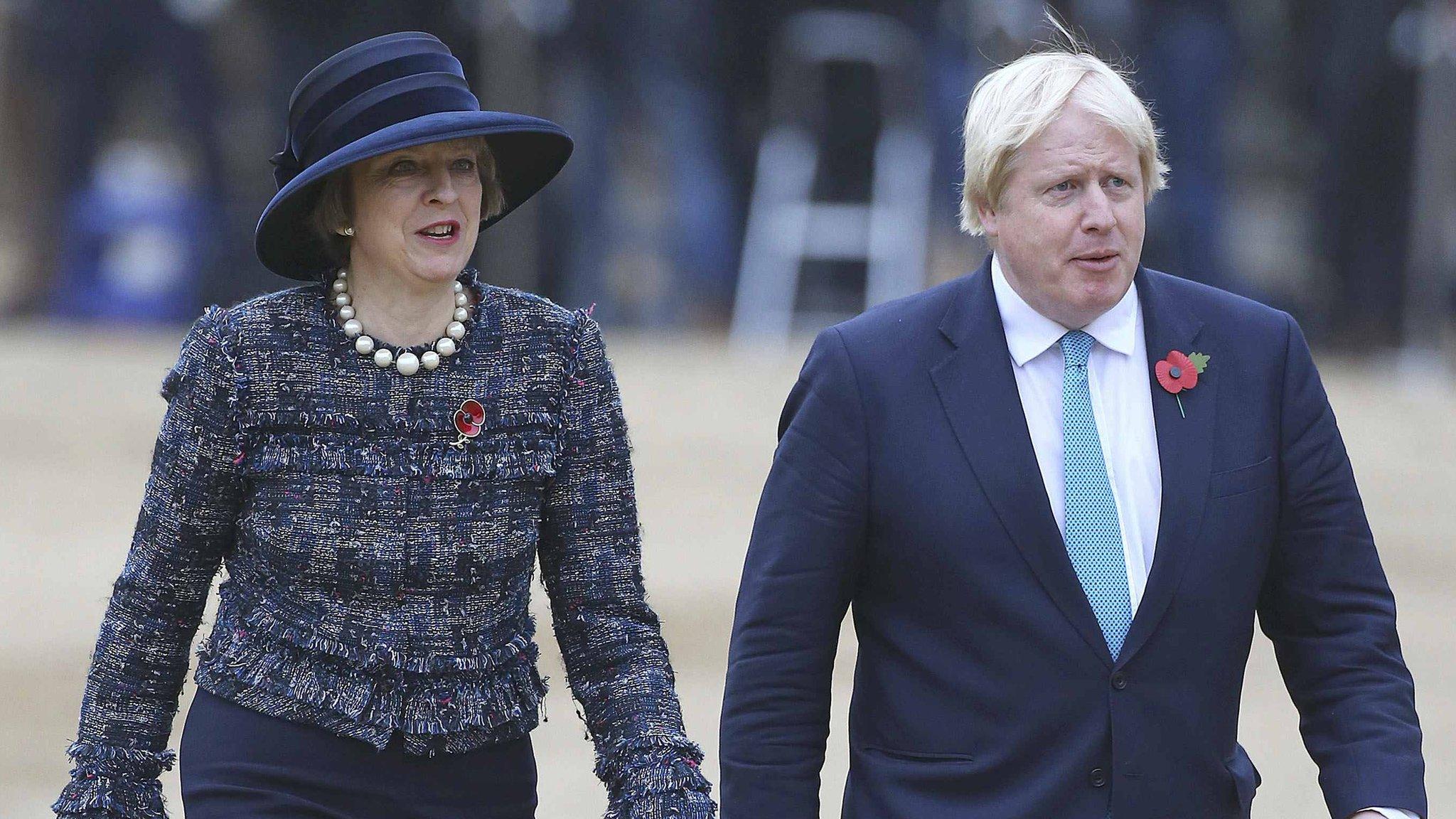Tory MP Stephen Phillips quits over 'irreconcilable differences'
- Published

Stephen Phillips has been an MP since 2010
Conservative MP Stephen Phillips has quit over "irreconcilable policy differences" with the government.
The MP, who has held the Lincolnshire seat of Sleaford and North Hykeham since 2010, backed leaving the EU but has accused ministers of ignoring Parliament since the Brexit vote.
He said he was "unable properly to represent the people who elected me".
It comes as Theresa May said she was confident she would win a legal battle over her approach to Brexit talks.
On Thursday, three High Court judges ruled the government cannot officially notify the EU of its intention to leave, thus beginning formal talks, without Parliament's support.
In a series of phone calls, the prime minister told European Commission president Jean-Claude Juncker and Germany's Angela Merkel that the government believed it would win its Supreme Court appeal against the ruling and she was committed to triggering Article 50 by March 2017.
'Growing differences'
Although Mr Phillips represents a safe Conservative seat, his surprise departure increases the pressure on Mrs May's government - which has a working majority of 17.
It is not yet clear whether Mr Phillips, who won the seat last year with a majority of more than 24,000, will stand as an independent in a future by-election although this is thought to be unlikely.

Analysis
by Ross Hawkins, BBC political correspondent
The government's values were no longer his values. On child refugees, on the use of aid money, on the handling of Brexit, he dissented from a party he thought was heading inexorably to the right.
That is the view from sources close to Stephen Phillips. One said he twice rejected a meeting with the prime minister.
Will other Tories follow? Some on the party's left tell me they'd rather stay and fight. Others reflect ruefully that unlike him they have no well-paid alternative career as a barrister.
A by-election in a safe seat won't much trouble party bosses. But while Downing Street doesn't want one, the departure of - yet another - Tory MP means the voices calling for a swift general election will grow a little louder.

The politician, who is a barrister and part-time Crown Court judge, is the second Conservative MP to stand down in as many weeks - Zac Goldsmith last week forced a by-election over his opposition to expanding Heathrow airport.
Sources say Mr Phillips informed party whips earlier this week that he would resign as an MP because he felt his values were not the values of the government.
He has been critical of the government's approach to Brexit since June's Leave vote, accusing Theresa May of trying to "ignore the views" of Parliament and avoiding scrutiny of the government's negotiating position.
'Plain wrong'
In a recent newspaper article, he suggested the government was "lurching to the right" and that its attempt to start negotiations with the EU without the explicit approval of Parliament was "divisive and plain wrong".
In a statement, he did not spell out the specific reasons for his resignation but said: "It has become clear to me over the last few months that my growing and very significant policy differences with the current government mean that I am unable properly to represent the people who elected me".
However, in a letter to his constituency chairman, Mr Phillips attacked the government for "shirking" responsibility for unaccompanied child refugees and changes in the way international aid is spent.
Mr Phillips said: "Some will label me a quitter or, no doubt, worse. Those are labels with which I can live. The label Conservative no longer is."
Speaking to the BBC last month, the now former MP expressed concerns over Brexit policy
In last year's election, Mr Phillips won a majority of 24,115, with 56% of the vote. Labour finished second, closely followed by UKIP.
Labour said the impending by-election would be "more about Tory failure and in-fighting than what is in the best interests of the country".
"It's clear that even Theresa May's own MPs realise that she has failed to lay out a convincing plan to deliver for Britain," said national campaign co-ordinator Jon Trickett.
UKIP leadership contender Suzanne Evans has said she would like to be considered to be the party's candidate in the by-election.
'Disappointed'
Asked about the resignation during a visit to Berlin, Foreign Secretary Boris Johnson suggested it was part of the prevailing "sturm und drang" (storm and stress) over Brexit - a reference to the movement of 18th Century German writers who gave free expression to emotions and ideas which sought to break with tradition.
He told reporters he did not believe that the legal battle over Parliament's role would "interfere" with the UK's Brexit timetable - insisting that the High Court ruling was "one stage" in the legal process and the British people had made their views clear.

Theresa May and Jean-Claude Juncker spoke by telephone
Mrs May has also been seeking to reassure EU leaders about the UK's commitment to Brexit following Thursday's legal setback.
No 10 said she had explained the government was "disappointed" by the ruling but felt it "had strong legal arguments ahead of the case moving to the Supreme Court".
The European Commission said the timetable for beginning talks was in the UK's hands.
"The president explicitly said the legal order and the constitutional order of the UK will be respected and we won't speculate on a possible delay," a spokeswoman said.
The UK voted by 52% to 48% to leave the European Union in a referendum on 23 June.
The EU's other 27 member states have said negotiations about the terms of the UK's exit - due to last two years - cannot begin until Article 50 has been invoked.
- Published4 November 2016

- Published3 November 2016